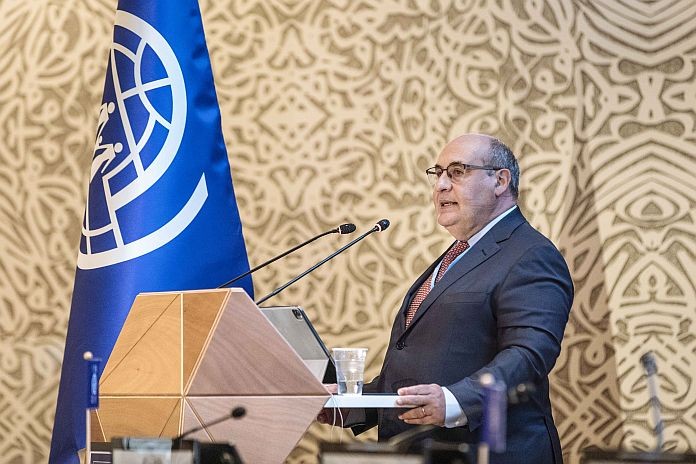GENEVA Switzerland – Representatives of the International Organization for Migration’s 174 member states are meeting in Geneva this week to consider how to create predictable and accessible cross-border mobility options in the face of more than 111,000 travel-related measures taken to contain the COVID-19 pandemic.
“While most of these measures are conditions rather than restrictions on entry… the resulting complex patchwork of measures, frequently changing in scope and application, has placed a chilling effect on cross-border mobility, particularly for those unvaccinated,” IOM Director General António Vitorino said Monday at the opening of the High-level segment of IOM’s 112th Council session which is being addressed by 48 heads of state, ministers and deputy ministers.
This year’s Council, held as the Organization marks its 70th Anniversary, comes as governments around the world announce strict new rounds of travel restrictions since South Africa revealed last week it is investigating the emergence of a new coronavirus variant dubbed Omicron by the World Health Organization.
While acknowledging the responsibility of governments to protect the health of their citizens and to reduce transmission of the virus, DG Vitorino urged IOM’s member states to collaborate to ensure responses are coordinated, do not exacerbate mobility inequities and anticipate future pandemics.
“My core concern is that, without international cooperation, we may find ourselves in a deeply uneven landscape with respect to mobility. If we assume, as I think we should, that there will be future health crises, even as variants proliferate, I look forward to your deliberations as to how we can prepare for the next pandemic and ensure that any necessary curtailment of mobility in the future is both safe and predictable,” he said.
“But as we remain focused on means to end the grip of the pandemic on our societies and our economies – and recognize the long road ahead, particularly in view of the new variant Omicron – we must acknowledge the deep impacts that the COVID-19 pandemic has had for people on the move: people stranded in transit, families separated across borders, migrants left unemployed, but unable to afford the return home.”
DG Vitorino encouraged an evidence-based approach to border management-related responses like travel restrictions and domestic mobility controls that have emerged since news of the first cases of coronavirus emerged from Wuhan, China, in December 2019, noting the severe impact COVID-19 lockdowns have had on socio-economic development and the attainment of the Sustainable Development Goals.
“We must generate a better understanding of to what extent, how, and when, travel restrictions contributed to effective management of COVID-19 and develop means to assess the relative value, and risk of different measures and restrictions over the course of a health crisis,” he said. “This, of course, depends on context and capacity, but emerging evidence suggests that while border closures can be important to slow spread, they have less impact once the virus is circulating within a country.”
The international community must ensure cross-border mobility safeguards public health and facilitates predictable travel in a way that gives all travelers, including migrants, reasonable costs, and manageable criteria for entry, he said.
“IOM has done a great deal of work in this regard, developing COVID-19 specific Standard Operating Procedures (SOPs) for frontline border officials at Points of Entry and assisting national authorities to conduct health-border assessments. But we still see challenges in capacity across the world, and particularly at land borders, and in developing regions of the world,” DG Vitorino said.
He noted deep inequities exist for migrants and displaced persons, from access to vaccination, legal identity, documentation and certification, and digital infrastructure support for countries that may be left behind by new conditions of travel.
“Individuals coming from low-vaccinated or high-risk countries are finding it harder and more expensive, to move, even within their own region. We must leave no person, or country, behind.”
IOM’s annual Council reviews the Organization’s policies, programmes and activities, examines and approves its budget and expenditures, and takes actions to further its strategic goals.







